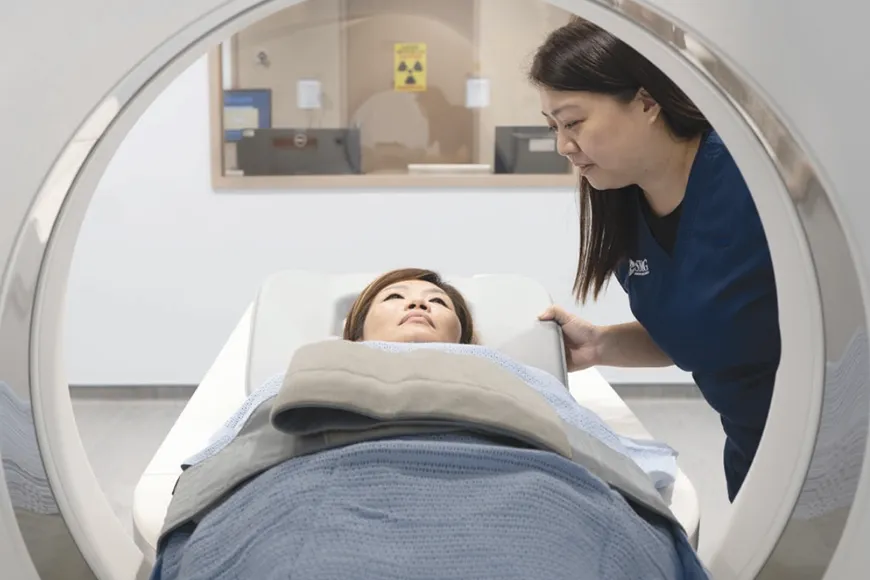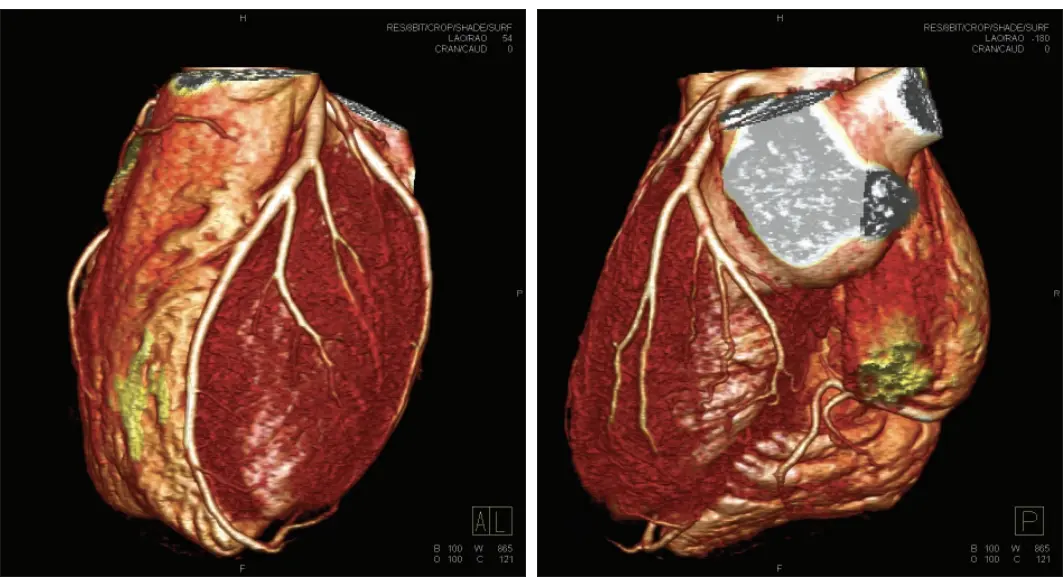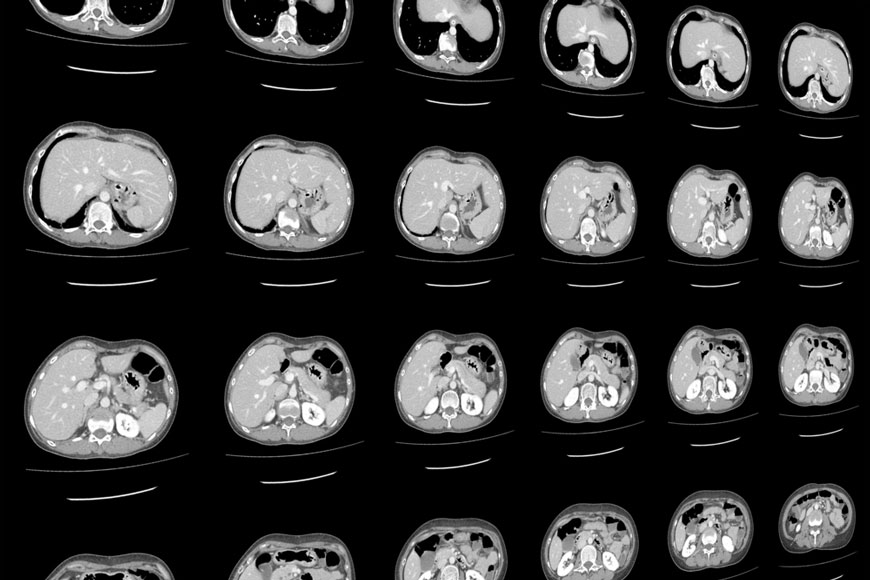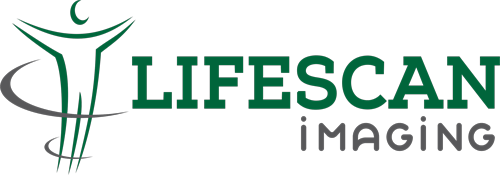
Coronary CTA (Coronary CT Angiography) is an x-ray imaging technique performed with intravenous (IV) contrast (dye) which examines the blood vessels that supply the heart. At the same time the structure of the heart is also well visualised and so the examination is sometimes simply called a cardiac CT.
Lifescan Imaging uses a Siemens SOMATOM Drive Dual Source CT scanner that enables the beating motion of the heart to be “frozen”, giving clearer and more accurate pictures. The latest technology in this scanner also permits the scan to be carried out in the majority of patients with much lower radiation doses than before.
What is Intravenous (IV) Contrast?
Intravenous (IV) contrast is an iodine-based colourless liquid. The contrast is delivered into your body through a small plastic tube known as an intravenous cannula, which is placed into a vein in your arm. This improves tissue contrast and allows the blood vessels and other body structures to be better visualized. The contrast will eventually be excreted out of your body within a few hours.
What is it for?
Coronary CTA is a non-invasive imaging technique used to visualise the coronary arteries and assess for any blockages or abnormalities. Fatty deposits or calcium deposits (called plaques) may build up in the coronary arteries and obstruct blood supply to the heart muscle. If left untreated, it may lead to heart muscle damage due to insufficient oxygen supply. This can lead to fatigue, shortness of breath, chest pain and/or a heart attack. Research has shown that a normal coronary CTA scan is a strong indicator of the absence of coronary artery disease. Overall, CTCA is valuable for diagnosing and managing heart disease.
The following are just some of the circumstances under which a cardiac CTA may be used:
- Evaluation of chest pain
- Evaluation of coronary artery anomalies
- Evaluation of coronary arteries in those with new onset of heart failure
- Assessment of complex congenital heart disease
- To check the integrity of bypass grafts and/orimplanted stents
- Pre-surgical assessment of coronary arteries



Who should go for Coronary CTA?
Coronary arteries supply blood to the heart muscle. The presence of Coronary Artery Disease can have serious implications by reducing oxygen flow and nutrients to the heart resulting in a heart attack without prior symptoms. Sometimes other cardiac tests produce uncertain results.
In these cases, Coronary CTA can evaluate the coronary arteries to confirm or exclude the presence of disease. People who may benefit from a Coronary CTA include:
- Individuals who are experiencing chest pains
- Individuals with one or more of the following risk factors
- Smoker
- High cholesterol
- High blood pressure
- Family history of coronary artery disease
- Obesity
- Diabetes
Coronary CTA may be helpful to rule out narrowing or blockage of a coronary artery, a pulmonary embolism, or an aortic aneurysm/ dissection.
How do I prepare for the scan?
- Fasting is not mandatory.
- Please avoid any caffeinated drinks (coffee, tea, energy drinks, or caffeinated sodas) on the day before/ the day of your scan.
- If you have a history of kidney problems, please provide us with your creatinine report done within the past 1 month on the day of scan.
- For diabetics, if you are on Metformin/ Glucophage, please stop medication on the day of the exam and resume taking it 48 hours after the scan.
- Do not use Viagra or any similar
Inform the staff if you are:
- Pregnant
- Asthmatic (please bring along your inhaler (if any))
- Allergic to iodine and/or shellfish or any medications
(There may be additional preparations required) - Any other concerns
How long will it take?
- You may be given a beta-blocker before the scan.
- This medication slows down your heart rate to acquire clear images.
- This process may take 15 minutes to an hour to slow down your heart rate.
- The actual scan will take less than 20 minutes

What to expect on the day of examination?
Before the examination
- You will change into a special gown.
- A nurse will insert an IV line into a vein in your arm for the administration of contrast (dye) during
your procedure. - You may be required to take a tablet to help slow the
heart rate down before the scan. - This will mean waiting a little longer for the medication to take effect.
- Your heart rate will be monitored during this period of time before proceeding with the scan.
During the examination
- You will lie on the scanner couch and you will be asked to raise your arms over your head for the duration of the exam.
- Sticky electrode patches will be attached to your chest to monitor your heart’s electrical signal during the scan.
- Nitroglycerin (GTN) will be sprayed under your tongue to help open up and enlarge your coronary arteries for better image quality.
- During the scan, you will feel the table move in and out of the donut-shaped scanner.
- You will be asked to hold your breath several times during the scan.
- You will receive a contrast injection through your IV during the scan and this may produce a warm sensation as the contrast circulates through your body. You might experience a metallic taste in your mouth as well.
- These sensations will not last more than a few seconds.
What Should I Do After The Scan?
- Drink plenty of water after the scan to remove contrast from your body.
- You may resume Metformin 48 hours after receiving the contrast.
- Some patients might experience adverse reactions to the contrast agent. If you feel itching or red spots on the skin, swollen mouth or eyes or even difficulty in breathing, please inform us or see a doctor immediately.


